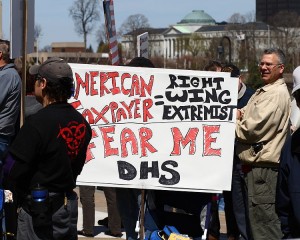Who’s scarier these days, the government or the people?
Mark Lilla looks at the disconnect between public and private realms in his excellent essay in the New York Review of Books, “The Tea Party Jacobins,” which examines the anti-government, anti-intellectual forces currently enjoying prominence in the U.S. The most tangible manifestation is, of course, the screaming mob known as the Tea Party, which seems driven by racism, paranoia and a lack of introspection. But what about reasonable people who have grown to distrust their government, even before the economic meltdown?
My only critique is that I think Lilla gives short shrift in his argument to the rise of new media, in which interconnectivity is key but primacy of the individual seems to be the main psychological draw. An excerpt:
“Ever since the Seventies, social scientists have puzzled over the fact that, despite greater affluence and relative peace, Americans have far less trust in their government than they had up until the mid-Sixties. Just before the last election, only a tenth of Americans said that they were ‘satisfied with the way things are going in the United States,’ a record low. They express some confidence in the presidency and the courts, but when asked in the abstract about ‘the government’ and whether they expect it to do the right thing or whether it is run for our benefit, a relatively consistent majority says ‘no.’ It’s important to remember that the confidence they express in free markets and deregulation is only relative to their sense that government no longer functions as it should.
And they are not alone. Survey after survey confirms that trust in government is dissolving in all advanced democratic societies, and for the same reason: as voters have become more autonomous, less attracted to parties and familiar ideologies, it has become harder for political institutions to represent them collectively. This is not a peculiarity of the United States and no one party or scandal is to blame. Representative democracy is a tricky system; it must first give citizens voice as individuals, and then echo their collective voice back to them in policies they approve of. That is getting harder today because the mediating ideas and institutions we have traditionally relied on to make this work are collapsing.”
Tags: Mark Lilla

